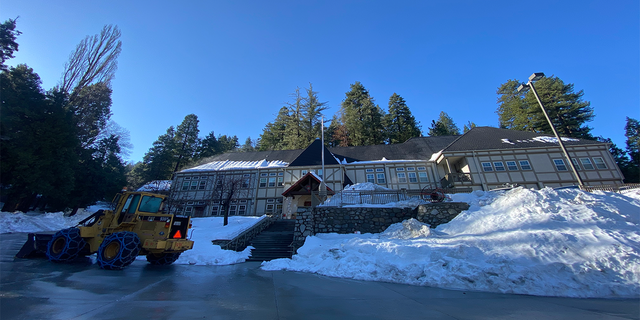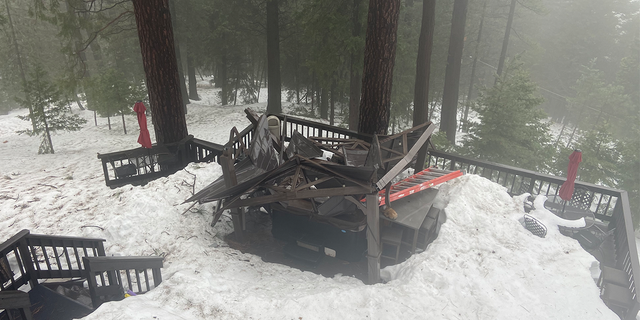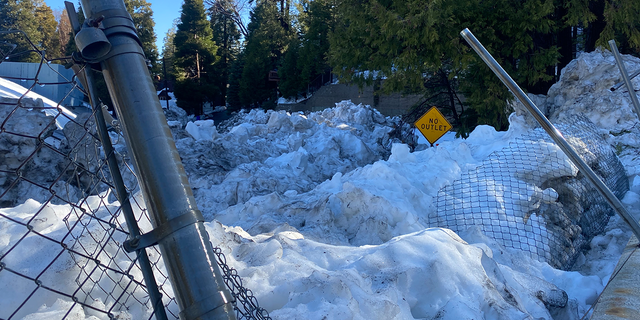SoCal mountain communities still clearing snow from rare blizzard, others trapped weeks later
LAKE ARROWHEAD, Calif. – A winter wonderland just ahead of spring blasted most parts of the United States in the past few weeks, from the Nor’easter in the northeast to a rare blizzard in southern California.
In the San Bernardino Mountains, where residents are used to wildfires, not snow storms, some are still trapped, and others are left without a home three weeks since up to nearly 10 feet of snow pounded homes, businesses and roads. At least 13 people died. And now, a slushy mess and slow melting snow is what’s left.
The last time the area received similarly significant snowfall was in 1991 during the “March Miracle,” when up to six feet of snow fell.
“We do not get blizzard warnings in this area. I wouldn’t even say it happens rarely,” said Eric Sherwin, the public information officer with the San Bernardino Fire Department.
NOR’EASTER BRINGS HEAVY SNOWFALL TO NORTHEAST, NEW ENGLAND WITH COLD EXPECTED TO CONTINUE
San Bernardino County, the largest in the United States, stretching more than 20,000 square feet, hasn’t been under a blizzard warning in decades.
“This storm was very different. We’re looking at record level snowfalls in many of these communities, such that life pretty much ground to a halt,” Sherwin said.
About 15 miles east of the hardest hit communities from this year’s storm is Big Bear Valley. Residents were buried under over five feet of snow in late January 2010. From the winter season’s first storms in November 2009 to March 2010, that area received nearly nine and a half feet of snow. In comparison, mountain communities in the San Bernardino National Forest were trapped in the same amount of snow in days.
One Crestline, California, woman and her husband woke up to a wall of white surrounding their home.
“We had two gazebos on our decks just smashed to smithereens on top of all of our patio furniture, and a fire ring and all kinds of things just took everything out. That sound really brought us up. I thought, Oh my gosh, what’s next? What’s going to go next?” Paige Renfro said. “At that time, our roof had at least four feet on it, and this is a big house with a lot of roof space.”

She couldn’t even see the house across from hers a week ago.
She and her husband have lived in Crestline, California, for 38 years in the San Bernardino Mountains, living in their “treetops.” Their home, which rests on a steep slope, wasn’t damaged, but not everyone was so lucky.
Paige said that with a generator, food and even their snowplow, the Renfro residents became a “command post.”
CALIFORNIAN WRITES ‘HELP US!’ IN SNOW AS WINTER STORM COULD STRAND RESIDENTS FOR A WEEK
“We have a couple of girls that live two doors down, and they and their cats could not get out to get help… They put a little sign in their window that said ‘help us trapped,” Renfro said. “And the problem was, we couldn’t see the sign because the drifts were higher. So finally, we were digging, and my husband looked in and saw that sign and they dug them out.”
The storm impacted a 52-mile area from end to end, and the San Bernardino County Fire Department received well over 1,800 calls.
They maintain a fleet of eight snow cats equipped with fire gear, the largest fleet in the region. With a “complete loss of road structures,” the snow cats were the only vehicles used during the worst of the icy roads.
“Because of these, we did not have a single person call 911 who we could not access. And it’s thanks in no small part to the snow cats,” Sherwin said.
They returned to the traditional fire engines and ambulances in the past few days as the snow melted. In the days following the storm, they used ATVs on the ground and fire boats on the lakes.

Officials are still assessing the damage, but residents are faced with rebuilding destroyed homes, digging their submerged cars out, and ensuring all people have successfully gotten out. Most of the damage was to carports, sheds, garages and other structures not built to withstand the weight of multiple feet of snow.
Michael Rachau is originally from Crestline but currently lives in Topanga Beach, California. He broke his ribs while visiting, and now he’s riding out the aftermath at a friend’s house.
CALIFORNIA FLOODING PROBLEMS GROW AS NEW STORM REACHES STATE
“You know, weeks later, we’re snowed in. I haven’t seen this much snow since I lived here,” Rachau said.
Goodwin’s, one of the only grocery stores serving the Lake Arrowhead and Crestline communities, is still closed after the snow damaged the property. It’s been open since 1946.
“It’s about five minutes down to go and get bread or go and get milk, and that we’re going to miss that for a while,” Renfro said. “They (the owners) have a really positive attitude toward it, so it made me feel better to hear them being so positive. They’re not giving up. They’re going to rebuild. And we need a grocery store up here.”
The closest Walmart is about 17 miles away — and inaccessible during the storm.
With help from multiple agencies, as far south as San Diego and as far north as Santa Barbara, the county has cleared most of its county and state roads.
SOUTHERN CALIFORNIA RESIDENTS FRUSTRATED AFTER RECORD SNOWFALL TRAPS THEM FOR OVER A WEEK: ‘EXHAUSTING’
But some in more remote parts of the mountains, like the Renfros, live on private roads that the county is not responsible for plowing. If they’re not plowed, power companies can’t get to them. Their neighbors were out of power for nine days.
“The roads down below us were a network of darkness,” she said. “There was no way they were getting out, and they had no power, so it was cold, dark and no communication.”

She compares it to the Titanic.
“After the rowboats rode out, (they) waited for the ship to sink, and then they came in to try to rescue people. They looked around and they said, ‘We waited too long,’” Renfro said. “And I believe that because 13 people passed away up here.”
She says officials should step in regardless because their roads are private, though paved, which she and her husband paid for out of pocket for the neighborhood.
“I’m not down on the county by any means. I think that they followed their protocol,” Renfro said. “Clearing a path to safety is paramount. That should actually trump the protocols that the county or anybody else has in place during a disaster. That should actually be the primary thing. And I’m sure it was, but I think that the forgotten few of us didn’t feel that way.”
CALIFORNIA BUILDINGS STILL ENDANGERED BY TUMBLING OCEANSIDE HILL, DOZENS FORCED TO FLEE
She says she would like to see an amendment to change the approach to who’s responsible for plowing private roads during a natural disaster.
“They have to generate people to come and get access to all roads, private, state, county roads,” Renfro said. “If another disaster comes, I don’t want 13 people to die because of it.”
The fire department says it approached the snowstorm similarly to it’s approach to wildfires exhausting all resources available.
They created a prescription delivery program in response to this year’s snowfall. All local pharmacies participated, and the fire department helped facilitate delivery to those trapped. And food and firewood distribution were organized as well.

“The county had every apparatus and personnel at its disposal assigned and committed to this incident,” Sherwin with the fire department said.
Schools reopened, and life was almost normal in Lake Arrowhead Village, the main shopping and dining center, Thursday — 20 days after the Feb. 24 blizzard.
But the snowplowing carries on for the Renfro’s, who are still clearing their private roads with a snowcat they’ve had to repair multiple times.
CLICK TO GET THE FOX NEWS APP
“Everybody is equal on this mountain. There are lives on every road, whether they’re deemed county or not,” Renfro said. “
The next steps are insurance claims and damage assessment.
“We look at these communities that live under the constant threat of wildfire and pave significant premiums for fire insurance,” Sherwin with the fire department said. “And then it’s a winter storm that comes and takes people’s homes. And that’s been a hard, hard pill for me to swallow.”
Read the full article Here


